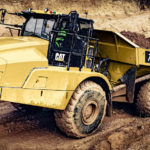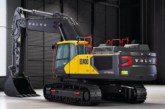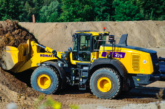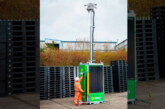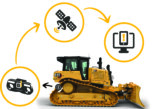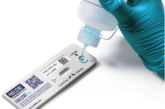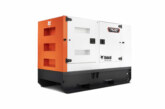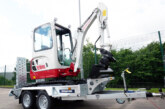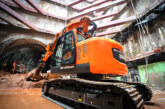Catching the early warning signs of failure is critical in maintaining safety when working with construction machines. It also avoids unplanned downtime and costly breakdowns. Here, Nick Kakoudakis, Technology and Remote Services Manager at exclusive Caterpillar dealer Finning UK and Ireland, discusses how digital connectivity means that Finning can ensure the longest life from its equipment.
If you’ve recently insured a vehicle, you’ll have probably heard of the black box. Installed on some insured cars, these devices monitor how the car is driven and report that information back to the insurance company. This information is used to encourage safe driving and to capture vital data in the event of an accident.
A watchful eye-in-the-sky
While installing a black box in a car is relatively cheap, managing downtime, breakdowns and user-profiles across a highly varied fleet of construction equipment can be costly. The costs can include everything from recovery and repair of the equipment, as well as the resulting loss of production uptime and construction delays.
Unlike the black box, Finning’s solution — Cat Connect — combines the use of smart technology and services on equipped machines, making sure everything is running as effectively and reliably as possible. The insight and information received helps to improve jobsite efficiency, whether the goal is to maximize production, reduce cost or improve safety.
When installed on Finning Cat equipment, Cat Connect records every parameter on a Cat machine and reports the information back to Finning HQ. The technical team of experienced Cat certified engineers then work through the data and looks for any problems and opportunities for optimisation.
For instance, a few minutes of idle time for a dump truck may be necessary during loading and unloading, but a backhoe operator keeping the engine running during a lunch break may lead to bore glazing on a diesel engine. If a machine is running idle then it is incurring extra fuel, maintenance and staffing costs for no real benefit — the team at Finning can spot issues like this and advise appropriate action.
Similarly, an engine might be running rough. Perhaps it has been unused for a while and the fuel is stale, or the fuel mixture is misconfigured for the type of work or weather conditions — the team at Finning identifies these problems and can advise users to replace the fuel or alter the fuel mix to compensate.
Tracking outside of the fence
Cat Connect devices also include GPS, which allows engineers to track the machines as they move around the work area. This also allows for “geofencing”, where an alarm is triggered if equipment is moved outside a designated area.
In one instance, Finning engineers were alerted by a geofencing alarm in the middle of the night. Using the GPS tracker on Cat Connect, the machine was successfully tracked and retrieved the next day from a secluded lay-by, over 20 miles away from the worksite. Without Cat Connect and its real-time alarms and customer-configurable alerting capabilities via text or emails, it’s very unlikely that it would have been recovered, especially if the equipment was stripped for parts.
Uncovering operational optimisations
Real-time condition monitoring not only helps to predict failure and keep equipment running, it also uncovers some surprising systemic problems.
One particular example was on a worksite that had a substantial hill that earthmoving equipment often traversed. Going up the incline was no trouble for the heavy equipment, but it was found through condition monitoring that the operators were allowing vehicles to coast when travelling back down.
By not using the retarder correctly, the operators were inadvertently exposing the powertrain to extreme stresses. Finning advised the customer that this was a problem and the operators were retrained to use the retarder correctly and safely. This action directly increased the working life of the equipment, saved thousands of pounds in costs and eliminated the potential downtime.

